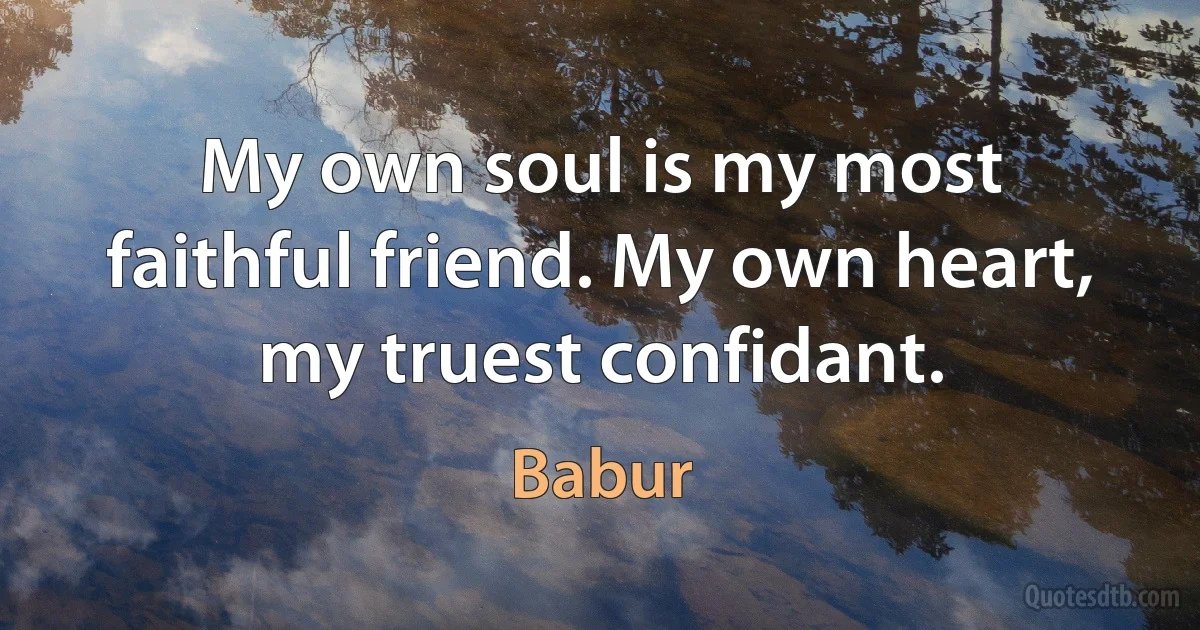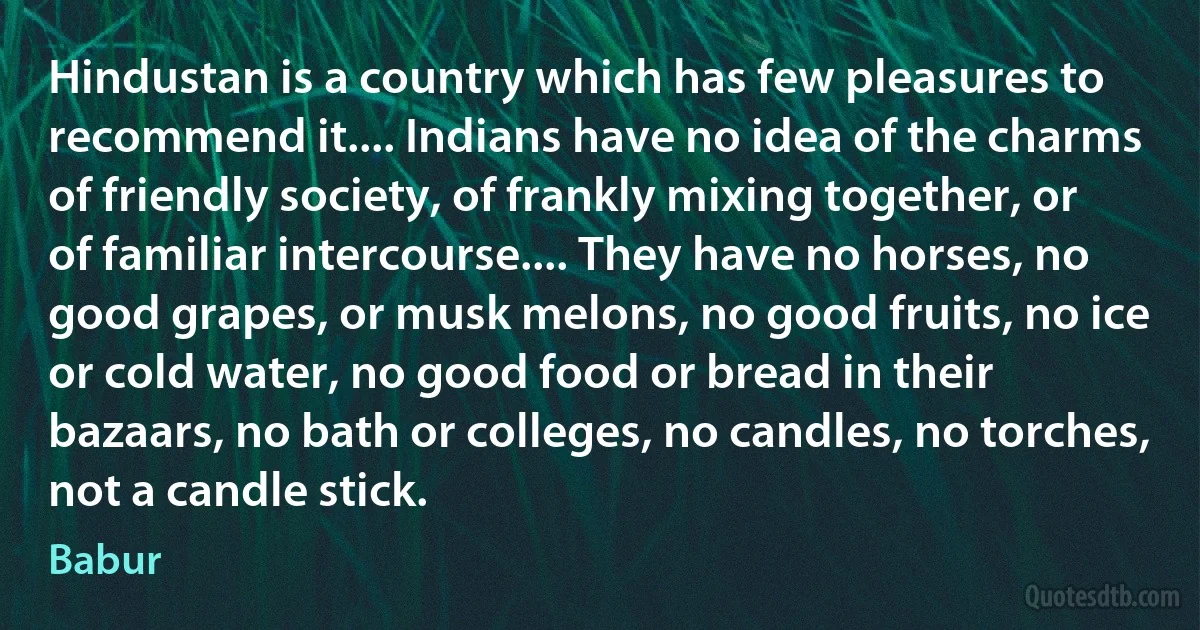Babur quotes
After this success, Ghazi (Victor in a Holy-war) was written amongst the royal titles. Below the titles (tughra) entered on the Fath-nama, I wrote the following quatrain:
For Islam's sake, I wandered in the wilds,
Prepared for war with pagans and Hindus,
Resolved myself to meet the martyr's death,
Thanks be to Allah! a ghazi I became.

Babur
'And victory the beautiful woman (shahid) whose world-adornment of waving tresses was embellished by Allah will aid you with a mighty aid, bestowed on us the good fortune that had been hidden behind a veil, and made it a reality. The absurd (batil) Hindus, knowing their position perilous, dispersed like carded wool before the wind, and like moths scattered abroad. Many fell dead on the field of battle; others, desisting from fighting, fled to the desert exile and became the food of crows and kites. Mounds were made of the bodies of the slain, pillars of their heads.

Babur
I have not written all this to complain: I have simply written the truth. I do not intend by what I have written to compliment myself: I have simply set down exactly what happened. Since I have made it a point in this history to write the truth of every matter and to set down no more than the reality of every event, as a consequence I have reported every good and evil I have seen of father and brother and set down the actuality of every fault and virtue of relative and stranger. May the reader excuse me; may the listener take me not to task.

Babur
I made public the resolution to abstain from wine, which had been hidden in the treasury of my breast The victorious servants, in accordance with the illustrious order, dashed upon the earth of contempt and destruction the flagons and the cups, and the other utensils in gold and silver, which in their number and their brilliance were like the stars of the firmament They dashed them in pieces, as, God willing! soon will be dashed the gods of the idolaters, - and they distributed the fragments among the poor and needy.

Babur
[Hindustan] is a wonderful country. Compared with our countries it is a different world; its mountains, rivers, jungles and deserts, its towns, its cultivated lands, its animals and plants, its peoples and their tongues, its rains, and its winds, are all different. ...Once the water of Sind is crossed, everything is in the Hindustan way, land, water, tree, rock, people and horde, opinion and custom.

Babur
Next day, at the time of the noon prayer, we went out for seeing those places in Gwalior which we had not yet seen' Going out of the Hathipole Gate of the fort, we arrived at a place called Urwa'...'Solid rocks surround Urwa on three sides' On these sides people have carved statues in stone. They are in all sizes, small and big. A very big statue, which is on the southern side, is perhaps 20 yards high. These statues are altogether naked and even their private parts are not covered'...'Urwa is not a bad place. It is an enclosed space. Its biggest blemish is its statues. I ordered that they should be destroyed.

Babur
Chandiri I stormed in 934 A.H. (1528 A.D.) and, by God's pleasure, took it in a few hours; in it was Rana Sanga's great and trusted man Midni Rao, we made general massacre of the Pagans in it and, as will be narrated, converted what for many years had been a mansion of hostility, into a mansion of Islam.

Babur
As the Bajauris were rebels and at enmity with the people of Islam, and as, by reason of the heathenish and hostile customs prevailing in their midst, the very name of Islam was rooted out from their tribe, they were put to general massacre and their wives and children were made captive. At a guess more than 3000 men went to their death; as the fight did not reach to the eastern side of the fort, a few got away there. The fort taken, we entered and inspected it. On the walls, in houses, streets and alleys, the dead lay, in what numbers! Comers and goers to and fro were passing over the bodies... With mind easy about the important affairs of the Bajaur fort, we marched, on Tuesday the 9th of Muharram, one kuroh (2m) down the dale of Bajaur and ordered that a tower of heads should be set up on the rising ground. On Wednesday the 10th of Muharram, we rode out to visit the Bajaur fort. There was a wine-party in Khawaja Kalan's house, several goat-skins of wine having been brought.

Babur
All these trod the road to Hell, removing from this house of clay to the pit of perdition. The enemy's country was full, as Hell is full, of wounded who had died on the road. The lowest pit was gorged with miscreants who had surrendered their souls to the lord of Hell. In whatever direction one from the army of Islam hastened, he found everywhere a self-willed one dead; whatever march the illustrious camp made in the wake of the fugitives, it found no foot-space without its prostrate foe. All the Hindus slain, abject and mean, By matchlock-stones, like the Elephants' lords, Many hills of their bodies were seen, And from each hill a fount of running blood.

Babur
According to old records, it has been a rule with the Muslim rulers from the first to build mosques, monasteries, and inns, spread Islam, and put (a stop to) non-Islamic practices, wherever they found prominence (of kufr). Accordingly, even as they cleared up Mathura, Bindraban etc., from the rubbish of non-Islamic practices, the Babari mosque was built up in AH 923 (?) under the patronage of Sayyid Musa Ashiqan in the Janmasthan temple (butkhane Janmsthan mein) in Faizabad Avadh, which was a great place of (worship) and capital of Rama's father'...'A great mosque was built on the spot where Sita ki Rasoi is situated. During the regime of Babar, the Hindus had no guts to be a match for the Muslims. The mosque was built in AH 923 (?) under the patronage of Sayyid Mir Ashiqan' Aurangzeb built a mosque on the Hanuman Garhi' The Bairagis effaced the mosque and erected a temple in its place. Then idols began to be worshipped openly in the Babari mosque where the Sita ki Rasoi is situated.

Babur
Wherever they found magnificent temples of the Hindus ever since the establishment of Sayyid Salar Mas'ud Ghazi's rule, the Muslim rulers in India built mosques, monasteries and inns, appointed mu'azzins, teachers, and store-stewards, spread Islam vigorously and vanquished the Kafirs. Likewise, they cleared up Faizabad and Avadh, too, from the filth of reprobation (infidelity), because it was a great centre of worship and capital of Rama's father. Where there stood the great temple (of Ramjanmasthan), there they built a big mosque, and where there was a small mandap (pavilion), there they erected a camp mosque (masjid-i-mukhtasar-i-qanati). The Janmasthan temple is the principal place of Rama's incarnation, adjacent to which is the Sita ki Rasoi. Hence, what a lofty mosque was built there by king Babar in AH 923 (AD 1528) under the patronage of Musa Ashiqan! The mosque is still known far and wide as the Sita ki Rasoi mosque. And that temple is extant by its side.

Babur


